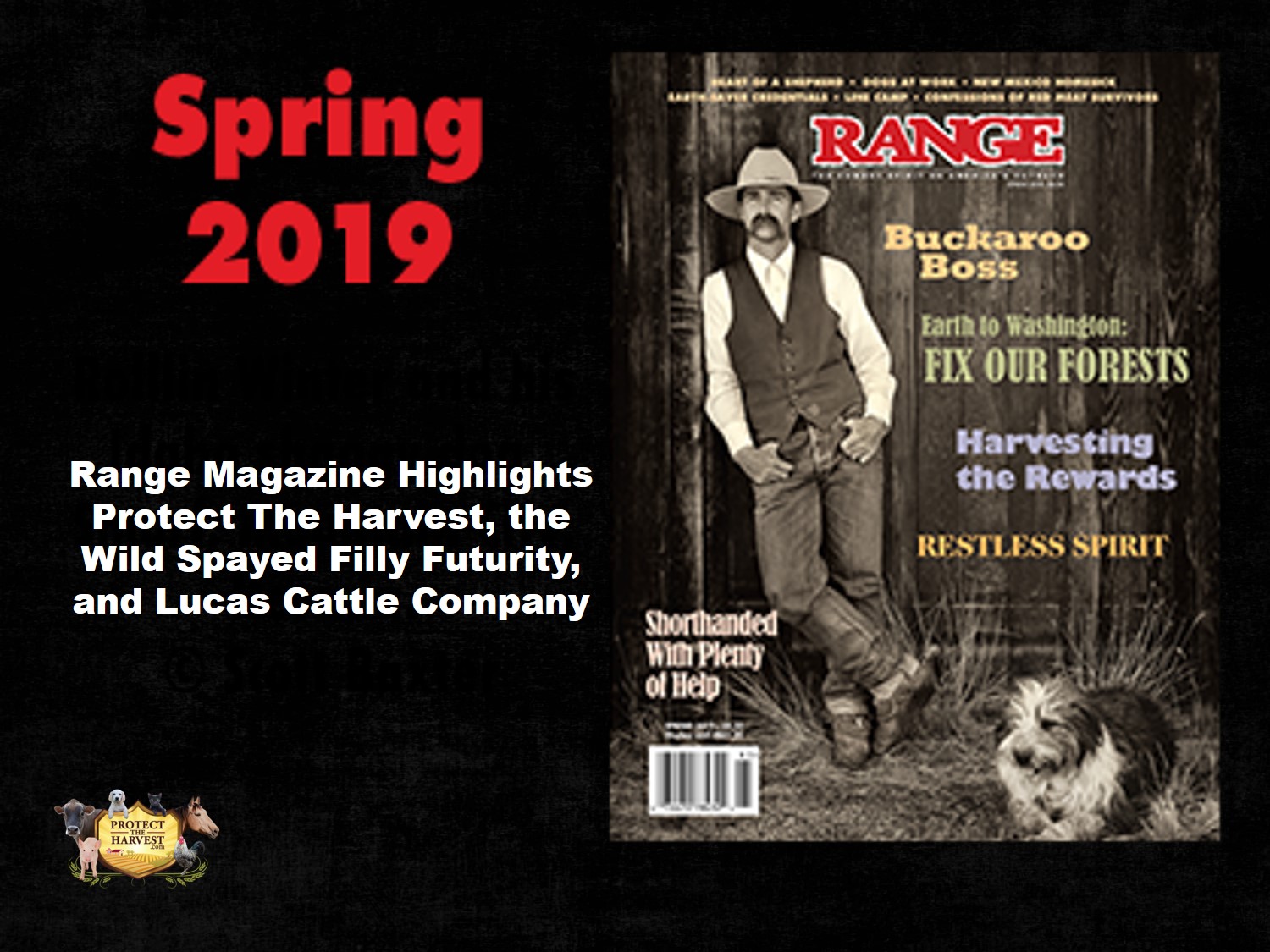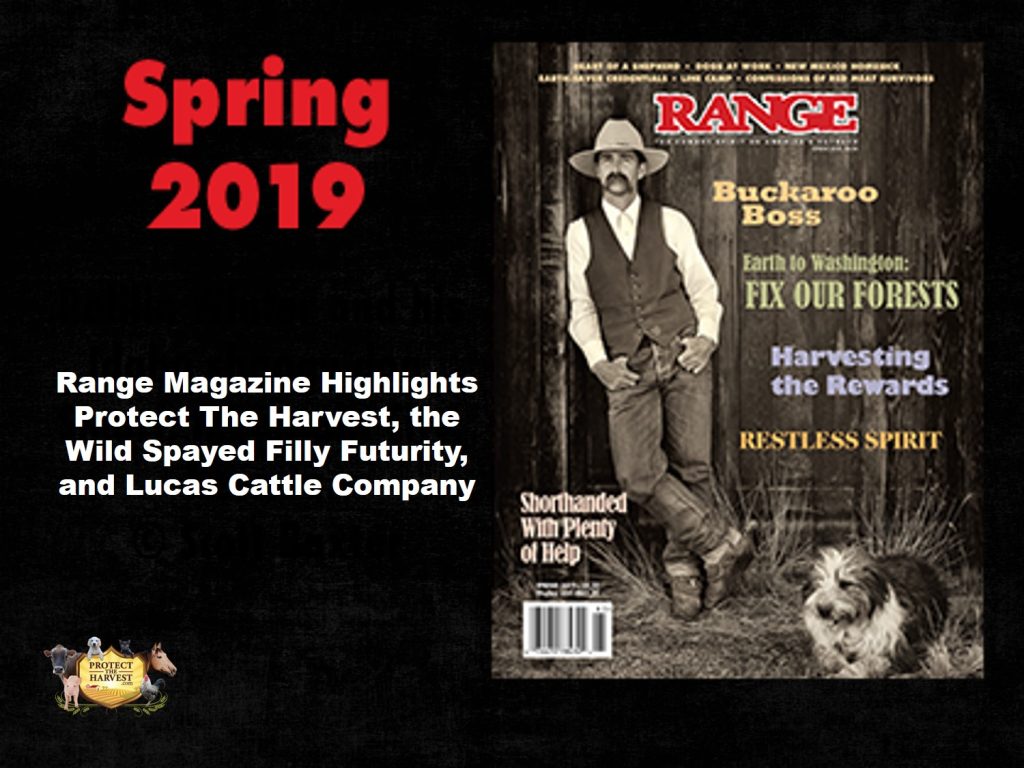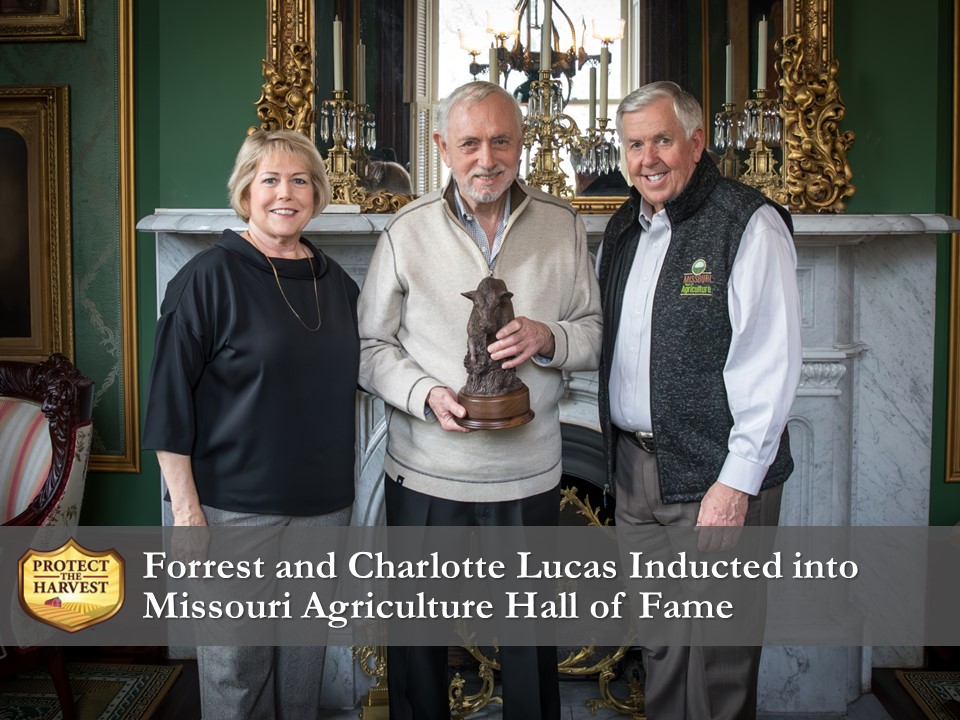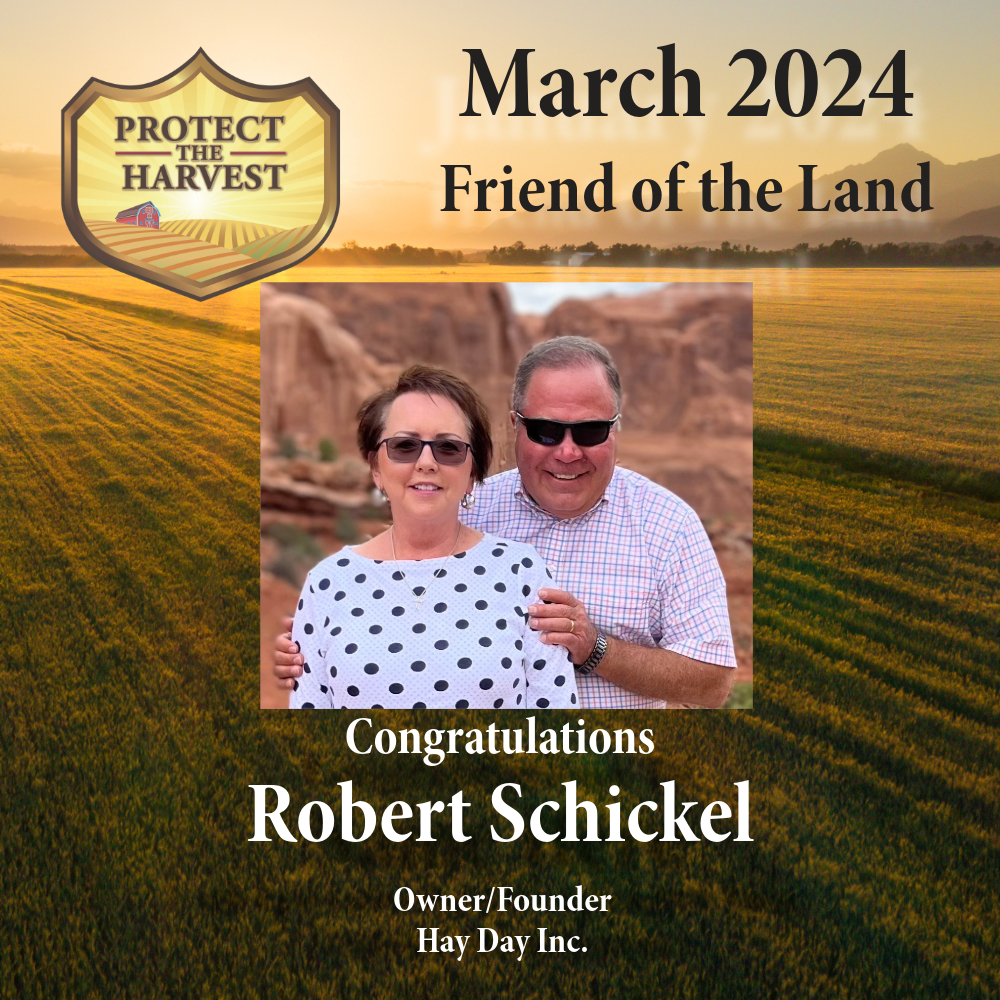
We are excited to announce that Protect The Harvest, the Wild Spayed Filly Futurity, and Lucas Cattle Company were featured in the Spring issue of Range magazine!
The first article pertains to Forrest Lucas, the founder of Protect The Harvest, the organization itself, and their efforts to encourage the Trump administration to pardon Dwight and Steven Hammond.
“Harvesting the Rewards of Life
Forrest Lucas and wealth well spent.
By Marjorie Haun
“Money, pardon the expression, is like manure. It’s not worth a thing unless you spread it around, helping young things to grow.”
—Dolly Levi, “Hello, Dolly!”
Forrest Lucas knows a little about manure, and he knows a lot about helping young things grow. To be more specific, Forrest knows how to defend young things—and old—from hostile forces, so families can grow and prosper. As the owner of Lucas Oil, Lucas Cattle, and founder of Protect the Harvest, Forrest is sometimes mischaracterized as a magnate to whom agriculture is a hobby, but that couldn’t be further from the truth. Forrest is a defender, a protector, a trucker and a true-to-life rancher who puts his mind, heart, and money into the future of American agriculture and the families who make a living off the land.
Lean and unassuming, with a country boy’s Midwestern accent, Forrest has political capital in the highest places in American government, and that capital is spent carefully and only for the best causes. As an Indiana native with some leverage and conservative leanings, Forrest knows Vice President Mike Pence well. “Pence and I are pretty close,” Forrest says. “He wanted me to be secretary of Interior, and he actually chewed me out for not taking it. But there are so many things out here that need to get done that I don’t want to get pinned down to a desk.”
Executive Clemency
One of those “things” that Forrest needed to get done was a presidential pardon for Oregon ranchers Dwight and Steven Hammond, and he admits that he couldn’t have gone about it the way he did if he held high federal office. Having formed a friendship with both cowboys early on, Forrest stayed in touch with them from the time they went into federal prison. According to Forrest, Dwight told him, “Mr. Lucas, if anybody’s going to get us out of here, it’s going to have to be you.”
Forrest brought the plight of the Hammonds, and their outrageous sentence on charges related to fires on their Oregon grazing allotments, to the attention of the vice president and to the conscience of President Trump himself. (See “Enemies of the State” at www.rangemagazine.com.)
Forrest was not alone in his quest to rectify the gross injustice heaped on the Hammonds. Others, including some of President Trump’s closest advisors and influential figures associated with past presidents, worked intensively behind the scenes to free the imprisoned ranchers. But with his unique understanding of the implications of the Hammonds’ case to western farmers and ranchers, Forrest went to bat in a big way. “I started working on this and I got Pence to really know what was going on,” he says. “We had our lobbyist in Washington working on it, and Oregon Representative Greg Walden also talked to Pence about the Hammonds.”
Although the pardons did not come as quickly as hoped, the Trump administration listened and on July 10, 2018, the president signed an Order of Executive Clemency, freeing the father and son. On the eve of the pardons, Forrest says, “We were waiting and then I got the call, ‘Tomorrow it’s going to happen.’” Forrest flew his private plane to California, where Dwight and Steven were released from Terminal Island, and met them the following day. Forrest describes the chain of events: “I got up at three in the morning and flew out from Indiana. We had a movie studio not too far from Terminal Island so I had some photographers come out and get pictures of us chatting at the airport.”
Forrest’s plane trip to pick up Dwight and Steven was a big, big deal for the media. “There was something written about ‘The Millionaire and His Jet Plane’ that really set the story off nationally. Now the story wasn’t about my plane at all, but that angle had a lot of impact on the press and got their attention.” Sadly, it wasn’t until Forrest helped facilitate their freedom that the mainstream media paid any heed to the Hammonds’ ordeal. Nevertheless, it all ended with overflowing gratitude and affection for the ranchers and their families. “When we got to Burns, Oregon,” Forrest says, “there were about 200 people waiting—which was most of the town. We then went over to the house they built for Susie when they found out they would be going to prison. The ranch house is 52 miles from town and Susie just couldn’t be that far out by herself. It all came together so well, and I told Pence that when the people realized the good thing they had done, it would be one of the best things to ever happen for him and President Trump. Trump won the West when he pardoned those men.”
Protect The Harvest
Men acquainted with the field of battle know the difference between beating the other side in a skirmish and winning a war. The Hammonds were victims in the comprehensive war on agriculture, and though an important victory, winning their freedom was smaller in scope than other “food producers versus the government-radical special-interest industrial complex” clashes. Forrest is a fighting man, a David fighting the global Goliaths whose aim is to ban animal agriculture, animal ownership, and all beneficial relationships between humans, their pets, and the animals that feed them and provide thousands of valuable products.
Forrest’s David—Protect the Harvest—is taking on radical global Goliaths, including the Humane Society of the United States, People for the Ethical Treatment of Animals, and Direction Action Everywhere, which employs vandalism, theft and intimidation in its anti-animal-agriculture campaigns. Protect the Harvest fearlessly exposes these groups, often naming individuals who engage in criminal attacks on the human rights and private property of farmers and ranchers. Without Protect the Harvest, the “feel good” narratives pushed by HSUS and other extremist organizations would go largely unchecked, continuing to deceive countless well-intentioned people, using their donations in underhanded, often violent activities.
As helping to free the Hammonds was a dive into the deep end of politics for Forrest, so too is Protect the Harvest. With some pride and a lot of optimism, he says: “We got a good start and I’m so happy to see PTH on some steady legs. People know the war on animal agriculture is real. There is no other PTH out there fighting for the horse industry, the ag industry, ranching, or the hunting industry.” But Forrest doesn’t pretend the road ahead is easy. “Ranchers and farmers don’t always get along, but we all have got to hang together and we can beat these other guys.”
Forrest has been watching the environmental movement since he was a young man. “It slowly worked its way through Europe destroying all kinds of industries.” The animal rights’ movement poses a similar threat. Forrest explains the events that led to the inception of Protect the Harvest: “Now when you look at HSUS, you have to keep in mind that these guys know how to lie. When they sponsored a voter proposition in Missouri, what you got in the introduction to the proposition was nice-sounding stuff, but when you dug down into it you found out that the law would put animal agriculture out of business and make it impossible to own a pet.”
Americans who have not been sucked in by HSUS and its sad, sappy appeals for cash may still fear its power to disrupt private agricultural enterprises and legitimate businesses such as pet stores and dog breeders. “A lot of people were scared of HSUS, but we went out there and took the battle on to make sure the Missouri proposition didn’t pass,” Forrest says. “They spent seven to eight million dollars and I personally spent about one million, and we lost. Fortunately, because it was a voter proposition, the Missouri Legislature was able to change it. I had to promise a lot of those lawmakers that I would have their backs, and I did. When all was said and done, the proposition was rejected with support from the governor. HSUS was having a fit!”
The experience with HSUS revealed a dearth of coordinated countermeasures against the radical groups pushing legislation in many states. Forrest has got plenty of other things he could be doing, but, he says, “If I don’t do this, nobody else will. We needed a name for what we were trying to do and Protect the Harvest was the best I could come up with.”
Deceptive and dangerous, the animal rights’ movement has branched out beyond agriculture and pets to the horse industry, dog racing, rodeos, county fairs, and other human/animal enterprises. Forrest has expanded the reach of PTH as well, advocating for individuals and industries under attack by extremists. Forrest, however, aims to turn the tables on HSUS and its vicious sister organizations. “I want this to get big enough and strong enough, with a staff of good people, so we can work with politicians. I want PTH to be well-known enough that people will come to us, and in the same way people worry about HSUS coming after them, I want the other guys to worry about us.”
Forrest is not a politician, but his political savvy gives him a valuable perspective on how to beat back the enemies of freedom and property rights. He has powerful advice for the ordinary Americans who want to make a difference. “I had a politician at my house who said, ‘People don’t realize this, but if we get just five written statements, where somebody takes the time to write to the government about something that is important to them, we take it seriously.’ So, the Department of Agriculture, Interior, all those people take you seriously if you say, ‘This is what we need to do and why.’”
Forrest hasn’t taken his rigorous road to success for granted, so he has a warning for the good people who may be complacent or unaware they’re being targeted by extremist groups. “There are so many people who say, ‘Ah, let someone else handle this,’ or ‘It’s not for me,’ but the world depends on ag people, and they’re now a small minority, the true ‘one-percenters.’”
Offering a sound solution, Forrest continues: “We have to get all these guys working in ag together and get their stories out to everyone. If we start doing what HSUS is doing—going into schools, FFA and 4-H groups, talking to students and working with law enforcement—we can win. You can no longer sit back and expect someone else to defend your rights. You have to be a farmer and a politician.”
Not a man to back down from a fight, Forrest nevertheless doesn’t aspire to be an army of one. His success has not lulled him into complacency, and it’s likely he’ll be defending agriculture and property rights for the rest of his life. But fighting battles is only part of his motivation. He wants to inspire and activate others, the younger generation, to take their rights and futures into their own hands. Protect the Harvest, as well as his work in giving the Hammond family a new lease on life, are to Forrest what gives his wealth its true value.”
The second article explains the Wild Spayed Filly Futurity and its purpose.
“Wild Spayed Filly Futurity
A classy idea for natural talents.
By Todd Macfarlane
The first-ever Lucas Oil/Protect the Harvest Wild Spayed-Filly Futurity in Reno, Nev., in September 2018 was an unquestionable success. In contrast, there is no question that the federal government’s wild-horse program is an undeniable disaster. Because federal bureaucrats have been completely unable to come up with any real solutions to the excess feral horse problem and because Forrest Lucas has a track record of being willing to try new things, Vice President Mike Pence has charged him with developing private-enterprise solutions to the wild-horse problem. Having already commissioned the movie “Running Wild” to help frame the issues and call more attention to the problem, one of the first things Forrest did was start looking for ways to both “harvest” some of the vast supply of wild horses, and put them to productive beneficial use, as well as to show that neutering mares, just like gelding stallions, is a viable alternative for birth control and can produce good, reliable ranch or pleasure horses.
The Wild Spayed-Filly Futurity itself was the brainchild of Dave Duquette, Lucas’ right-hand man at Protect the Harvest, who is both a former Marine and reined cow-horse trainer. The idea was a crazy one—not to mention a very expensive experiment—but Lucas has never shied away from crazy new ideas, so he told Duquette to run with it, with full support from Lucas Oil and Protect the Harvest.
With that directive, Duquette made arrangements to adopt 12 two-year-old fillies from the BLM’s wild-horse facility in Burns, Ore., have them spayed, and with special approval auctioned them off during the Reno Snaffle Bit Futurity in 2017. The goal was to bring them back a year later to compete in their own special division, to showcase the natural abilities of wild horses and the reliable usability of spayed mares. Throughout the event Duquette wore T-shirts and hoodies for sale by PTH that said, “The best gelding I ever rode was a spayed mare.”
What better way to prove the point than through the rigors of a competition patterned after the snaffle-bit futurity in Reno, with cutting, reining, and individual cow work. And the wild spayed fillies didn’t disappoint—including a big dose of mustang spitfire attitude. During the spayed-filly futurity finals, a veteran horseman and longtime snaffle-bit futurity participant grabbed Forrest Lucas by the arm and said: “This Wild Spayed-Filly Futurity has added a whole new dimension and injected a whole new level of energy and excitement into this event that has been missing for years. Thanks so much for being willing to step up to the plate.”
During a break in the competition, a Wells Fargo stagecoach entered the arena. On it were Forrest and Charlotte Lucas and recently pardoned Harney County, Ore., ranchers Dwight and Steven Hammond. Duquette, who also helped to secure the Hammonds’ release, made an emotional introduction. “Aside from the birth of my son,” he said, “our work to help get Dwight and Steven out of prison has been one of the most important and rewarding experiences of my life.”
In terms of the competition results, the 12 spayed fillies covered the full spectrum of ability and attitude, but the race for first place ended up being very stiff. It has long been said that the West was won on a bay, and on the strength of some big moves and an exceptionally high score in “cow work,” it was a quick, cowy little bay filly by the name of Three Fingers Holly—owned, trained and shown by Lance Johnston (above)—that edged Three Fingers Blonde, a beautiful, leggy, solid-performing palomino, by one hundredth of a point, to win the Wild Spayed-Filly Futurity and take home the $25,000.
It was a classy, exciting event, offering a lot for people to look forward to in years to come. It also offers a better life for excess horses.”
The third article highlights Forrest Lucas’ cattle operation: Lucas Cattle Company.
“Lucas Cattle Company
Born from a natural resource.
By Todd Macfarlane
Unbeknownst to many and despite the rapid growth and success of Lucas Oil, its founder, Forrest Lucas, came from a challenging, poor, underprivileged background, but was blessed to spend a lot of time on his grandparents’ farm when he was growing up. It was there he learned the virtues of honesty, production, thriftiness and self-sufficiency. Based on his humble farm roots and the experience he later developed fitting and showing cattle, Forrest left home while still in high school and got a job for a reputable seed-stock breeder, taking care of his show cattle.
“For the last three years of high school,” Forrest says, “I got up early every morning, usually around four a.m., to do chores before going to school, and then I’d do it all again after school. My summers were spent tending, fitting, and showing cattle.”
He realized that after graduating from high school he needed to do something that would give him a better opportunity to get farther ahead in the world. “So I started driving trucks, and as soon as I was able, I started a trucking company, which eventually led to the development of Lucas Oil.” It was based on Forrest’s love for trying new things and his desire to develop oil-additive products that would extend the useful life of his trucks. But he never lost his love for cattle or his desire to own and develop a cattle ranch.
Although Lucas Oil became successful very quickly, land was too expensive in Indiana where they lived, so Forrest and his wife, Charlotte, began looking for a good spot to start their cattle business. They considered Texas, Oklahoma and Kansas.
Eventually they settled in Cross Timbers, Mo., where Lucas Oil was also helping to sponsor development of a racetrack. Once they found a base property, Forrest spent a year living there, working on the place, buying cattle and equipment, and generally getting things started. At this point, Forrest has enough going on between Lucas Oil, a fleet of trucks, and Protect the Harvest, just to name a few, that he has no choice but to allow a cowboy crew of loyal employees to do most of the work running the ranch. “But Charlotte and I spend as much time there as possible.”
Because he loves trying new things and understands the genuine need for a different kind of cattle than most seed-stock producers are raising today, Forrest and his cowboy crew have been developing a Simmental/longhorn composite that includes the most desirable characteristics of each breed—including the calving ease and low-maintenance of longhorn cattle, along with the heavy muscling and good meat quality of the Simmental. Contrary to what some may believe, Lucas Cattle Company is no toy ranch. At this point, under Forrest’s direction, ranch manager Gary Hubert and a crew of four or five cowboys run a total herd of 2,500 mother cows on several properties that comprise Lucas Cattle Company in southwest Missouri.
Based on his working-class background and his understanding of basic fundamental principles, including the law of the harvest—you reap what you sow—Forrest Lucas also created and funded Protect the Harvest, as a nonprofit educational/activism venture, based on his long-standing affinity and genuine concern for agricultural producers and the challenges they face.
“We’ve worked hard to be productive, and our ranch is part of that effort. We’ve been very blessed, and we feel a moral obligation to pay it forward and see if we can help other producers stay in business.” “
Part 1 of Range magazine highlight
Part 2 of Range magazine highlight
Part 3 of Range magazine highlight
Part 4 of Range magazine highlight




